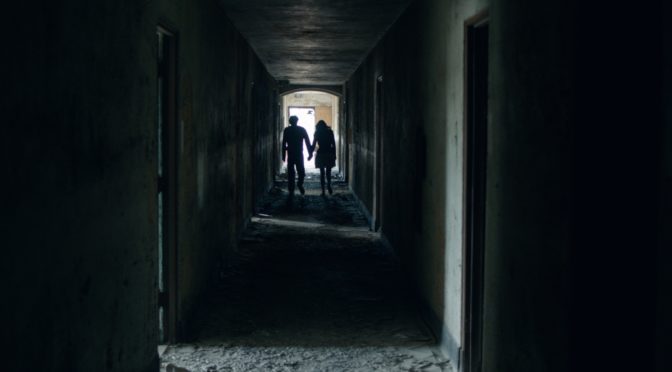Embers takes place in a near future where a virus that causes memory loss has spread to the entire population. When people go to sleep or even after only waiting a few minutes, they forget who they are and what they are doing. The world as we know it has collapsed and the remaining survivors wander aimlessly through the destroyed homes, picking up and losing companions along the way. We are presented a few different stories. A man (Jason Ritter; Freddy vs. Jason) and a woman (Iva Gocheva; Sneakers) wake up next to each other in a dilapidated home. Neither recalls their names or their relationship to each other. The only clue they have is a blue piece of cloth each has tied around their wrists, indicating some type of connection. They decide that they must have been a couple, settle on names for each other, and explore the area, searching for supplies. A parallel story involves a man and his young adult daughter who have been living in an underground bunker for the past decade. While cutoff from society, the two are also disease free and can recall their past. Their zoned days and nights are a point of contention for the daughter who wants to experience more than their routine existence.
The setting reflects the lives of the characters. Without the memory of having a home, nothing has been maintained. Buildings are crumbling, rooms are in disarray, and everything seems to be abandoned. Even the cinematography feels blank. The colors are desaturated with the palette emphasizing shades of gray above all else. The world feels deliberately empty and drained of life.

Interactions between characters are unfortunately as cold and stilted as the environment. The initial conversation between Ritter and Gocheva feels unprofessional, like first time actors attempting a dry run at a scene. The dialogue itself is weighed down by the exposition clumsily woven in to explain the background of the world. Each time the characters try to connect verbally, it only shows how poorly written the film is. As the father and daughter argue over the value of a dull, repetitive life with memory versus a uncertain but varied life without it, the gravity of their discussion never hits home. It just feels like a whiny, immature child arguing with a controlling parent. Even when it gestures at deeper emotions, the combination of amateur acting and underdeveloped dialogue undercut the film’s ambitions.
There are only a few moments when the film is able to successfully explore the implications of its premise. The rapid memory loss means that even the strongest emotions and events in a life, good or bad, will soon be forgotten. This has effects beyond simply forgetting one’s own name. A severe, life-changing emotional trauma can simply evaporate. People stop in the middle of crying because they have forgotten why they started in the first place. A short separation from a loved one can lead to forgetting their existence. How does a child develop without the ability to form memories? First time director Claire Carré clearly wants to explore these scenarios but loses sight of her goals in favor of explaining the setup. Instead of fully examining the consequences or benefits of life without memory, Embers squanders its interesting premise with wooden acting and exposition heavy dialogue.

2/5 stars.
